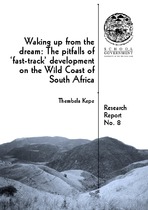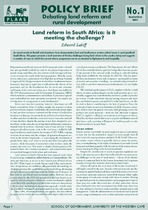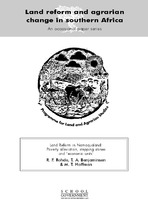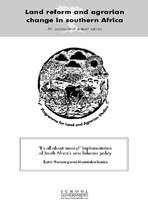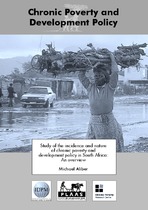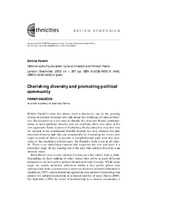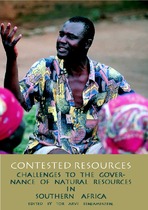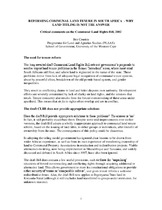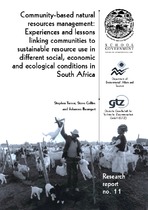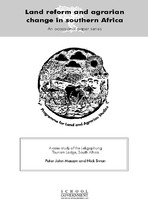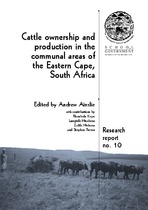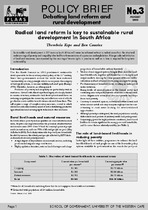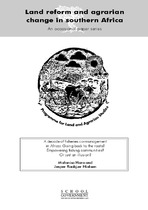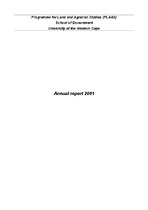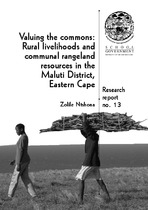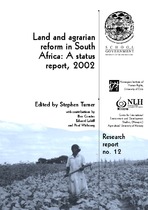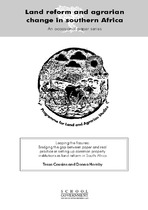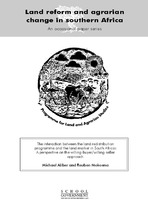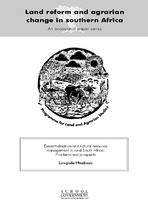Browsing Faculty of Economic and Management Sciences by Issue Date
Now showing items 21-40 of 1094
-
Waking up from the dream: The pitfalls of 'fast-track' development on the Wild Coast
(Institute for Poverty, Land and Agrarian Studies, University of the Western Cape, 2001)The main aim of this study was to explore the issues involved in reconciling the policy objectives of land reform, environmental conservation and the private sector profit-oriented rural development initiative in ... -
Land Reform in South Africa: Is it meeting the challenge?
(Institute for Poverty, Land and Agrarian Studies, University of the Western Cape, 2001)As recent events at Brendell and elsewhere have demonstarted, land and landlessness remain critical issues in post-apartheid South Africa. This paper presents a brief overview of the key challenges facing land reform in ... -
Land reform in Namaqualand: Poverty alleviation, stepping stones and economic units
(Institute for Poverty Land and Agrarian Studies (PLAAS), 2001)This paper examines the consequences of land reform for communal livestock farmers in Namaqualand. It investigates the likely outcomes of recent commonage acquisitions and tenure reform in the former ëColoured Reservesí ... -
'It's all about money! Implementation of South Africaís new fisheries policy
(Institute for Poverty Land and Agrarian Studies (PLAAS), 2001)This paper was originally written as part of an economics study commissioned by the Chief Directorate: Marine and Coastal Management (MCM) of the South African Department of Environmental Affairs and Tourism (DEAT). Since ... -
Study of the incidence and nature of chronic poverty and development policy in South Africa: An overview
(Institute for Poverty Land and Agrarian Studies (PLAAS), 2001)The purpose of this study is fourfold: first, to summarise the current state of knowledge about chronic poverty in South Africa; second, to describe the range of existing governmental and civil society initiatives which ... -
Rethinking multiculturalism: Cultural diversity and political theory
(SAGE, 2001)Bhikhu Parekh’s voice has always been a distinctive one in the growing chorus of political theorists who talk about the challenge of cultural diversity. His perspective is not easy to classify. He criticizes liberal, ... -
Contested resources: Challenges to the governance of natural resources in Southern Africa
(Institute for Poverty, Land and Agrarian Studies, University of the Western Cape, 2002)In this keynote address I wish to identify some important ideas and conclusions arising out of recent analyses of theory and practice on natural resource management. I use these in a preliminary attempt to argue that ... -
Reforming communal land tenure in South Africa – why land titling is not the answer: Critical comments on the communal land rights bill, 2002
(Institute for Poverty Land and Agrarian Studies (PLAAS), 2002)The long-awaited draft Communal Land Rights Bill sets out government’s proposals to resolve urgent land tenure problems in the former ‘homeland’ areas, where most rural South Africans still live, and where land is registered ... -
Community-based natural resources management: Experiences and lessons linking communities to sustainable resource use in different social, economic and ecological conditions in South Africa
(Institute for Poverty, Land and Agrarian Studies, University of the Western Cape, 2002)The project, which started in 1996 in partnership with the South African Department of Land Affairs (DLA), supports communities that have a stake in nature conservation areas through ownership, or a claim to ownership, ... -
A case-study of the lekgophung tourism lodge, South Africa
(Institute for Poverty Land and Agrarian Studies (PLAAS), 2002)The Lekgophung Lodge is a community-owned wildlife tourism lodge, located in the western part of the Madikwe Game Reserve in the North West Province of South Africa. The Lekgophung community is settled near the western ... -
Cattle ownership and production in the communal areas of the Eastern Cape, South Africa
(Institute for Poverty, Land and Agrarian Studies, University of the Western Cape, 2002)This report documents a study of the social and economic structure of cattle ownership and production in the communal tenure areas of the Eastern Cape (i.e. the former Bantustans of Transkei and Ciskei). The report ... -
Radical land reform is key to sustainable rural development in South Africa
(Institute for Poverty, Land and Agrarian Studies, University of the Western Cape, 2002)Sustainable rural development in 21st century South Africa will never be achieved without a radical assault on the structural underpinnings of poverty and inequality inherited from three centuries of oppression and ... -
A decade of fisheries co-management in Africa: Going back to the roots? Empowering fishing communities? Or just an illusion?
(Institute for Poverty Land and Agrarian Studies (PLAAS), 2002)This paper provides an overview of co-management in Africa and the historical, political and paradigmatic reasons for the shift. The historical context is important when analysing the performance of the regime. The main ... -
Annual report 2001
(Institute for Poverty Land and Agrarian Studies (PLAAS), 2002)PLAAS continues to grow and to take on new projects and staff. This presents a number of challenges, not least of which is the sustainability of such growth. The year 2001 saw the completion of a twelve month-long ... -
Valuing the commons: Rural livelihoods and communal rangeland resources in the Maluti District, Eastern Cape
(Institute for Poverty, Land and Agrarian Studies, University of the Western Cape, 2002)The ‘hidden’ value of wild resources, trees and grazing resources on communal rangelands is often overlooked by conventional economic assessments, even though their contribution to people’s lives is enormous. There is ... -
Land and agrarian reform in South Africa: A status report, 2002
(Institute for Poverty, Land and Agrarian Studies, University of the Western Cape, 2002)In 1994, South Africa started a new life as a democratic nation. It faced immense challenges. Multiple economic, social and political transformations were needed to overcome the legacy of colonialism and apartheid. The ... -
Leaping the fissures: Bridging the gap between paper and real practice in setting up common property institutions in land reform in South Africa
(Institute for Poverty Land and Agrarian Studies (PLAAS), 2002)New common property institutions (CPIs) were created in South Africa soon after 1994 to enable self-constituted groups of people a choice about how they wished to acquire, hold and manage land. They were to provide rural ... -
Community-based natural resources management: Experiences and lessons linking communities to sustainable resource use in different social, economic and ecological conditions in South Africa
(Institute for Poverty, Land and Agrarian Studies, University of the Western Cape, 2002)The project, which started in 1996 in partnership with the South African Department of Land Affairs (DLA), supports communities that have a stake in nature conservation areas through ownership, or a claim to ownership, ... -
The interaction between the land redistribution programme and the land market in South Africa: A perspective on the willing-buyer/willing-seller approach
(Institute for Poverty Land and Agrarian Studies (PLAAS), 2002)The debate rages on, in South Africa and elsewhere, about the desirability and efficacy of the willing-buyer/willing-seller approach to land redistribution. In South Africa, the willing-buyer/willing-seller approach is ... -
Decentralisation and natural resource management in rural South Africa: problems and prospects
(Institute for Poverty Land and Agrarian Studies (PLAAS), 2002)In this paper, the issue of decentralisation and natural resource management will be interrogated primarily through a focus on local government reform and land administration. This focus illuminates problems that are on ...

